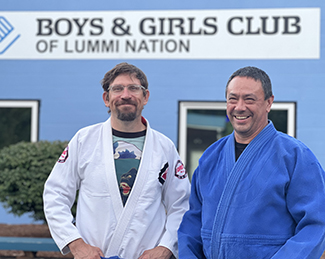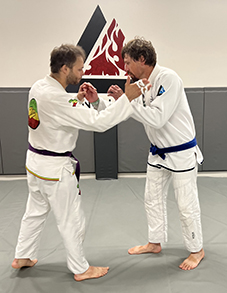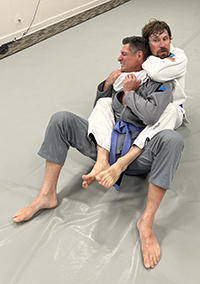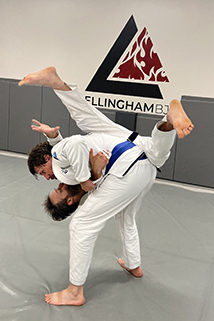
Ryan Tolman is a clinical social worker in private practice who specializes in anxiety and stress, and sees clients online and in person in his Bellingham, Wash., office. He also practices Brazilian jiu-jitsu, and has taught a martial arts training course for kids. He says activities like jiu-jitsu can help “take you away from your troubles,” especially when you’re growing up. Pictured at left: Ryan Tolman, MSW, LICSW, left, and Allan Hillaire of Lummi Nation (Photo by Ambur Tolman.)
Tolman’s therapy work is mainly with teenagers and young adults who have stress, anxiety and depression, as well as people with trauma history. “I address negative self-talk, like ‘I'm a disappointment’ or ‘I'm not good enough’ and work to replace this with ‘I can do my best’ or ‘I'm OK regardless.’ This might seem easier said than done, but I believe if thoughts are the current source of anguish, then thoughts can be the cure.”
Why Jiu-jitsu?

Tolman went back to school at age 37 to earn his MSW and said he became interested in mixed martial arts after watching matches on TV. Pictured at right: Jesse Johns, left, and Ryan Tolman begin a round at Bellingham BJJ in Bellingham, Wash., on Aug. 17, 2023. (Photo by Joe Carpenter.)
“I was at a local gym lifting weights, and there was a guy there who ran a (mixed martial arts) gym,” he said. “He turned out to be a really nice guy, and we arranged for him to train myself and my daughters (then ages 9 and 13) in kickboxing. We all really enjoyed it, and eventually I switched to jiu-jitsu because my wife was worried about me getting knocked out.”
Jiu-jitsu doesn’t emphasize punching or kicking and is much more defensive than kickboxing, Tolman said. “You can control the space and stay out of range. You can get in close so the other person can’t strike you.”
That keeps both people safe, he said, and “even if somebody attacks you, you don’t necessarily kick or punch.”
“I practice Brazilian jiu-jitsu, which was originally intended to neutralize physical attacks without harm to yourself or the attacker,” Tolman said. “If someone says ‘tap’ or taps you, you let go. It’s all about consent. It’s like stop, no matter what, and if you don’t, there’s no second chance. You’re just gone.”
Lessons Learned

Tolman said the power of consent is the most important lesson he has learned from Brazilian jiu-jitsu. Pictured at left: Tolman applies a chokehold during practice with Joe Carpenter at Bellingham BJJ in Bellingham, Wash., on Aug. 17 (Photo by Jesse Johns.)
“You have to trust your training partners with your well-being. There are a lot of chokes and joint locks, so if I get in a bad position, I need to know my training partner will stop if I tap,” he said. “I got bullied in high school, and I work with kids and teens who get bullied. It’s very powerful to be able to say, ‘I asked you to stop, and you need to stop.’”
“I think the culture of many jiu-jitsu gyms is more playful and fun than other martial arts, and you don’t necessarily have to be athletic to succeed,” Tolman said. “You can be clever and figure out moves ahead of the other player, like in chess. It’s very engaging.”
When Tolman became project manager for a grant, “We partnered with the Boys & Girls Club at Lummi (Indian Nation) and ran a martial art training course for the kids,” he said. “It was very well-attended.”
An average of 40 young people showed up for the training during the eight-week program, he said. “The kids were so cool. They’d help drag out the mats and everything.”
Why Social Work?
Tolman, MSW, LICSW, worked in rural community mental health for about 10 years, and he had been a team leader for eight.
“I stumbled into my job of mental health,” he said. “Turns out, I have a natural way to relate to kids and teenage boys.”
Tolman had been told the average length of time a person stayed in the position he held was two years. “With me, it was 10 years. I thought if I enjoy it, they’ll enjoy it.”
He worked on clients’ self-care skills, helped some with severe emotional disturbances, and also helped them just have fun. The next step was being director.
“I needed a master’s with a license to be a director,” he said. “Our agency director said social work had a lot of advantages and provided more opportunity for variety of work. Since then, I have worked in-patient, community outreach, as a project manager, and finally in private practice counseling.”
Similarities Between Social Work and Jiu-jitsu

Tolman said his profession and his hobby “both require hard work and discipline. Both can be incredibly difficult and equally rewarding.” Pictured at right: Tolman, standing, practices a hip-throw with Bellingham BJJ Manager Jesse Johns on Aug. 17. (Photo by Joe Carpenter.)
“I have learned to specialize in jiu-jitsu, and I have learned to specialize in social work,” he said. “I’m 47, and advice in the jiu-jitsu world is, ‘If you start later in life, you don’t have time to be great at everything, so work hard to sharpen one aspect of your game to stay competitive.’ In social work, I am specializing as a trauma therapist.”
What’s Next?
Tolman has had his private practice for about a year, and he works alone.
“I do miss the resources and support of working in community mental health,” he said. “I would absolutely love to set up an anti-bullying curriculum that includes problem-solving, verbal de-escalation and Brazilian jiu-jitsu.”
“No one deserves to be bullied or made to feel ‘less than.’ It’s heartbreaking, and if a few kids could learn the confidence to tell bullies ‘No,’ I think it would be worth the work.”